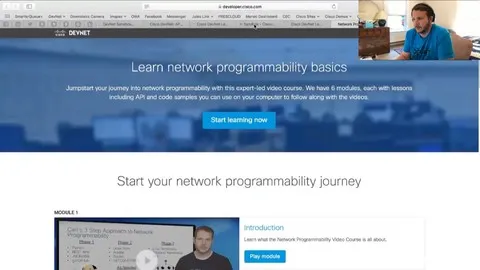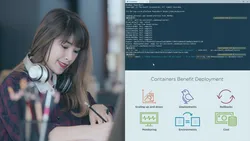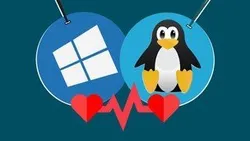
Net DevOps: Cisco Python Automation NETCONF SDN Docker 
This course provides an introduction to Cisco Network DevOps, covering topics such as ACI, Ansible, Python, SDN, Kubernetes, Docker, Containers, and NETCONF. It also includes free labs to help students gain hands-on experience. ▼
ADVERTISEMENT
Course Feature
![]() Cost:
Cost:
Free
![]() Provider:
Provider:
Udemy
![]() Certificate:
Certificate:
No Information
![]() Language:
Language:
English
![]() Start Date:
Start Date:
Self Paced
Course Overview
❗The content presented here is sourced directly from Udemy platform. For comprehensive course details, including enrollment information, simply click on the 'Go to class' link on our website.
Updated in [March 06th, 2023]
This course provides an overview of NetDevOps, a new approach to network automation. Students will learn about Kubernetes, the differences between lean and fat automation, and the advantages of using Python and Ansible for automation. Additionally, students will gain an understanding of Software Defined Networking (SDN) and Cisco Application Centric Infrastructure (ACI). By the end of the course, students will have a better understanding of the tools and technologies used in NetDevOps.
[Applications]
After taking this course, students will be able to apply their knowledge of NetDevOps, Kubernetes, Python, Ansible, SDN, and Cisco ACI to their own projects. They will be able to use Python and Ansible to automate network tasks, and use Docker and Kubernetes to deploy applications. They will also be able to use SDN to create virtual networks and Cisco ACI to manage them. Finally, they will be able to use NetDevOps to create a DevOps environment for their projects.
[Career Paths]
1. Network Automation Engineer: Network automation engineers are responsible for automating network operations and maintenance tasks. They use scripting languages such as Python, Ansible, and Bash to automate network tasks such as configuration, monitoring, and troubleshooting. This role is becoming increasingly important as organizations move towards more automated and efficient network operations.
2. Network Security Engineer: Network security engineers are responsible for designing, implementing, and maintaining secure networks. They use a variety of tools and techniques to protect networks from malicious attacks and unauthorized access. This role is becoming increasingly important as organizations move towards more secure and reliable networks.
3. Network DevOps Engineer: Network DevOps engineers are responsible for developing and maintaining automated network operations and maintenance processes. They use scripting languages such as Python, Ansible, and Bash to automate network tasks such as configuration, monitoring, and troubleshooting. This role is becoming increasingly important as organizations move towards more automated and efficient network operations.
4. Network Software Developer: Network software developers are responsible for developing software applications that are used to manage and control networks. They use a variety of programming languages such as Java, C++, and Python to develop software applications that are used to manage and control networks. This role is becoming increasingly important as organizations move towards more automated and efficient network operations.
[Education Paths]
1. Bachelor of Science in Computer Science: This degree path provides students with a comprehensive understanding of computer science fundamentals, such as programming, software engineering, and computer architecture. Additionally, students will learn about the latest trends in computer science, such as artificial intelligence, machine learning, and cloud computing.
2. Bachelor of Science in Network Engineering: This degree path provides students with a comprehensive understanding of network engineering fundamentals, such as network design, network security, and network management. Additionally, students will learn about the latest trends in network engineering, such as software-defined networking (SDN), network automation, and network virtualization.
3. Master of Science in Computer Science: This degree path provides students with an advanced understanding of computer science fundamentals, such as programming, software engineering, and computer architecture. Additionally, students will learn about the latest trends in computer science, such as artificial intelligence, machine learning, and cloud computing.
4. Master of Science in Network Engineering: This degree path provides students with an advanced understanding of network engineering fundamentals, such as network design, network security, and network management. Additionally, students will learn about the latest trends in network engineering, such as software-defined networking (SDN), network automation, and network virtualization.
Pros & Cons

Easy to understand

Human element to break down barriers

Precise explanation

Kind and patient instructor

Problem with pip and python2

Some content went over head

New topic for some learners
Course Provider

Provider Udemy's Stats at AZClass
Net DevOps: Cisco Python Automation NETCONF SDN Docker is a comprehensive course covering network automation and DevOps fundamentals. Learners will understand the principles of NetDevOps, including the use of Kubernetes, and the differences between thin and fat automation. They will also learn the use of Python and Ansible in automation, as well as the fundamentals of software-defined networking and Cisco's application-centric infrastructure. Finally, learners will learn about Docker and network automation. This course is ideal for those who want a comprehensive understanding of network automation and DevOps.
Discussion and Reviews
0.0 (Based on 0 reviews)
Explore Similar Online Courses

Android Performance

Intellectual Property Law and Policy: Part 1

Python for Informatics: Exploring Information

Social Network Analysis

Introduction to Systematic Review and Meta-Analysis

The Analytics Edge

DCO042 - Python For Informatics

Causal Diagrams: Draw Your Assumptions Before Your Conclusions

Whole genome sequencing of bacterial genomes - tools and applications

Managing Docker on Linux Servers

Fundamentals of Docker and Kubernetes for NET Developers


Start your review of Net DevOps: Cisco Python Automation NETCONF SDN Docker